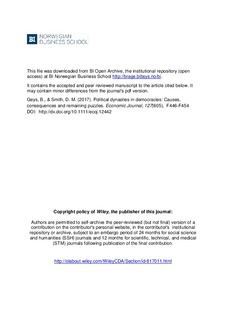| dc.contributor.author | Geys, Benny | |
| dc.contributor.author | Smith, Daniel Markham | |
| dc.date.accessioned | 2016-08-24T12:47:58Z | |
| dc.date.accessioned | 2017-11-03T08:55:59Z | |
| dc.date.available | 2016-08-24T12:47:58Z | |
| dc.date.available | 2017-11-03T08:55:59Z | |
| dc.date.issued | 2017 | |
| dc.identifier.citation | Economic Journal, 2017, 127(605), F446-F454 | nb_NO |
| dc.identifier.issn | 1468-0297 | |
| dc.identifier.issn | 0013-0133 | |
| dc.identifier.uri | http://hdl.handle.net/11250/2463884 | |
| dc.description | The accepted and peer reviewed manuscript to the article | nb_NO |
| dc.description.abstract | Kinship often continues to play an important role in determining the ruling class even under modern democratic elections in a wide range of countries. In recent years, academic interest in the causes and consequences of such dynasties has been rapidly expanding. In this introduction to the Feature, we review existing work on political dynasties’ formation and potential implications for socio-economic outcomes (such as economic growth, distributive policy, and gender representation), and outline a number of questions and challenges that remain important avenues for future research. | nb_NO |
| dc.language.iso | eng | nb_NO |
| dc.publisher | Wiley | nb_NO |
| dc.title | Political Dynasties in Democracies: Causes, Consequences and Remaining Puzzles | nb_NO |
| dc.type | Journal article | nb_NO |
| dc.type | Peer reviewed | nb_NO |
| dc.date.updated | 2016-08-24T12:47:58Z | |
| dc.source.journal | Economic Journal | nb_NO |
| dc.identifier.doi | http://dx.doi.org/10.1111/ecoj.12442 | |
| dc.identifier.cristin | 1374685 | |
| dc.description.localcode | 2, Forfatterversjon | nb_NO |
